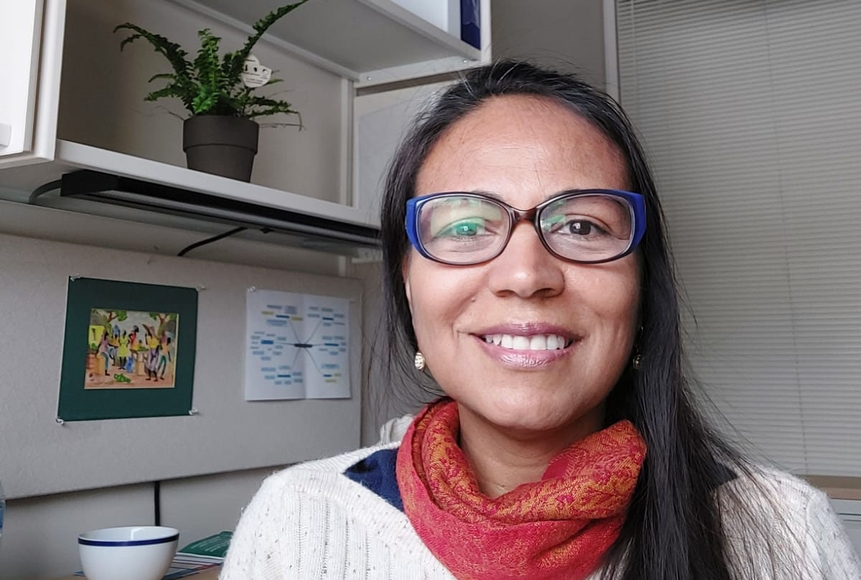Implementing an intersectional lens in human rights education
The Human Rights community at the University of Minnesota is excited to have Dr. Diana Quintero as our newest member. Dr. Diana Quintero of The Universidad Icesi Law School is a Visiting Human Rights Practitioner and Engaged Scholar at the Humphrey School of Public Affairs. As a pioneer of human rights law in Colombia’s law schools, Dr. Quintero brings her breadth of knowledge and experience regarding human rights in Latin America to the University of Minnesota community. Through her teaching, research initiatives, engagement with faculty and staff, and mentoring of students, Dr. Quintero is bringing attention to the intersectionalities of human rights in both Colombia and the U.S.

Dr. Quintero is not new to the University of Minnesota community. She first visited in 2013-14 as a Humphrey Fellow with a keen interest in international human rights law Issues. During this period, she worked at the University of Minnesota - Antioquia Human Rights Law Partnership, as a liaison between Colombian and UMN faculty and students, working to enhance the capacity of the four Colombian partner schools to defend human rights in their clinics.
When she returned to Colombia, Dr. Quintero saw the need for work on diversity issues, specifically regarding harassment towards the LGBTQ+ community and sexual misconduct. Dr. Quintero convened a group of faculty and students to develop a better understanding of the situations that people were experiencing and propose an equality of treatment policy for LGBTQ+ students and employees to the Universidad Icesi. She has since worked on the implementation of both this and the Sexual Misconduct and Other Types of Harrassment Policy.
In 2019, Dr. Quintero worked with the Latin American Law Scholars Network (ALAS) surrounding the Colombian Constitutional Court’s case on the decriminalization of abortions. She designed a legal strategy for the social movement that pushed this action. Her work included fostering working sessions with ALAS faculty specialized in criminal law, gender issues, sociology of law, and human rights law, to prepare a draft and supporting arguments for the pro-abortion social groups. Recently, on February 21, the Court made the decision to decriminalize abortion, thanks in part to the efforts of professionals like Dr. Quintero.
Dr. Quintero’s experience of human rights advocacy spans the right to health, the rights of migrants and displaced persons, sexual and reproductive rights, environmental rights, and the rights of minority populations such as LGBTQ+ and indigenous communities. From the moment she began her work with the Universidad Icesi Law School’s Human Rights Clinic, she tackled petitions for support from different underrepresented groups, and helped them through the steps to receive legal support and eventually, reparations. For much of its existence, the Law School dealt mainly with corporate issues, but the community around it was struggling with various human rights issues. Dr. Quintero wanted to give law students an opportunity to be attentive to not just corporate issues, but local human rights issues. “I wanted to bring law students an eye opening learning [experience], in order to prepare them to serve local communities' needs of representation and legal advice.
Throughout her time as a liaison for the UMN-Antioquia partnership and in her work since then, Dr. Quintero has developed and designed strategies for litigation and advocacy. The most important strategy, she believes, is attentive listening skills. She further emphasizes that in order to engage in respectful conversations with the people and communities you are helping. “Community leaders must be regarded as actors with wisdom about what the community is struggling with, and how to approach the situation. Attorney’s must help them frame these ideas in a legal perspective, create legal strategies, and go back to the community to build on those strategies in a participatory way.” And, Dr. Quintero adds, “you also need to be creative - the more difficult, the more backlash you receive for working on some issue, the more creative you have to be to keep pushing the agenda.”
After witnessing worsening human rights crises in recent years, Dr. Quintero has identified changes that need to take place in the field of human rights. “We should have more [human rights] trained professionals in politics and public policy, locally and internationally, and trained professionals with the ability to recognize different levels of discrimination, and how to restructure systems of injustice so that they provide reparations and justice”. Furthermore, Dr. Quintero sees the necessity of monitoring processes and indicator mechanisms to assess baseline outcomes of policy work. Following up with affected communities—affected by both rights violations and new policy implementation—allows researchers and advocates to better keep track of rights advances. Dr. Quintero believes that human rights students should make these monitoring mechanisms an essential part of their work and learn how to use them at different levels for different purposes.
In her new role as an engaged scholar at the University of Minnesota, Dr. Quintero is addressing similarities between the human rights field in the U.S. and in Latin America. She notes that “in Human Rights work, being able to connect problems, solutions, and resources is essential.” Highlighting the intersectionalities between rights and rethinking how we engage on local, national, and international levels are just a few of the tools that Dr. Quintero is providing for students at the University of Minnesota.
Beginning this month (March 2022), Dr. Quintero is leading two workshops for students. The Environmental Rights Workshop (PA 5790, section 3) allows students to choose a real human rights case regarding an environmental issue and then engage in role-playing simulations. The second workshop, Indigenous & Ethic Rights (PA 5480) has a similar format, but aimed at identifying how human rights violations are connected to bias and exclusion issues in different indigenous groups.
In Fall 2022, Dr. Quintero will be teaching Ethics and Global Health Rights (PA 5890, section 1), a semester long class centered on global health issues and their intersectionalities. When structuring her class, Dr. Quintero believes in “finding cases that are really meaningful to the students. Instead of studying the theory, I go towards theory from the practice. I think that is the better method for engaging students, ‘this is what is going on in the field, these are the real problems, now let’s start thinking about them in a human rights context.”


